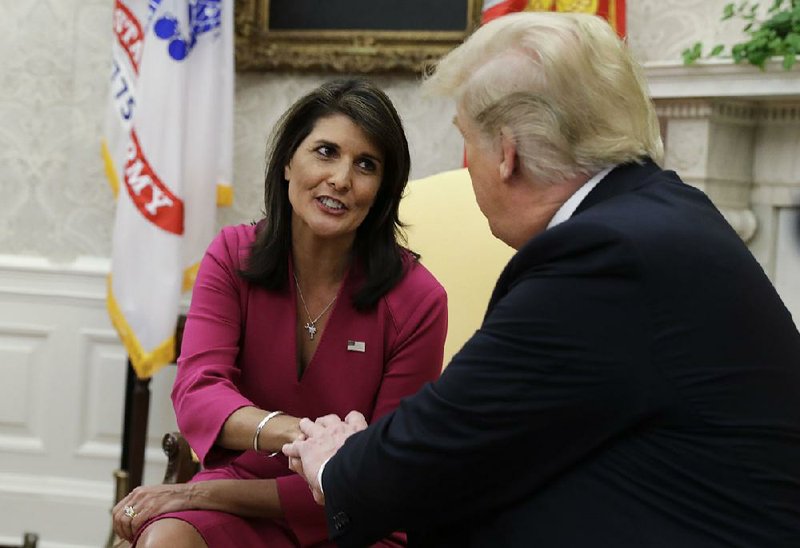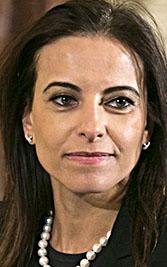WASHINGTON -- U.N. Ambassador Nikki Haley is stepping down at the end of the year, President Donald Trump announced Tuesday as Haley sat by his side in the Oval Office.
Trump praised the work of Haley, a former South Carolina governor who was confirmed as U.S. ambassador to the United Nations shortly after Trump's inauguration last year.
"She's done a fantastic job, and we've done a fantastic job together," Trump said, adding that Haley has been "very special to me."
Trump said Haley first told him about six months ago that she would like to "take a little time off" at the end of this year. Nevertheless, White House staff members were caught off guard by the announcement, which Haley and Trump had kept closely under wraps.
In her resignation letter, Haley praised the president for keeping a commitment to her that she would be "free to speak my mind on the issues of the day."
Haley listed what she called a series of successes at the United Nations, including that "we spoke out resolutely against dictatorships in Iran, Syria, Venezuela, Cuba, and yes, Russia."
Haley told the president that her resignation would take effect in January to "give you time to select a replacement and to give the Senate time to consider your selection."
"I expect to continue to speak out from time to time on important public policy matters, but I will surely not be a candidate for any office in 2020," she said.
Haley, who is seen in South Carolina and Washington circles as sharp-elbowed and ambitious, was said to have taken particular pride in keeping distance from the daily drama of the White House.
Some of Trump's political advisers have viewed her warily as a potential threat in 2020 and as a skeptic of the Trump agenda.
She was frustrated at being left out of some key debates earlier this year, administration officials said, and she was not seen as part of Trump's inner circle.
Trump told reporters that he is hopeful that Haley will return to the administration at some point, perhaps in a different capacity.
Speaking after Trump, Haley said serving as U.N. ambassador has been "an honor of a lifetime."
"I'm such a lucky girl to have been able to lead the state that raised me, and to serve a country I love so very much has really been a blessing, and I want to thank you for that," she told Trump.
"It was a blessing to go into the U.N. with body armor every day and defend America," Haley said. "I'll never truly step aside from fighting for our country. But I will tell you that I think it's time."
"I think you have to be selfless enough to know when you step aside and allow someone else to do the job," she added.
Trump said he hopes to name a successor to Haley in the next two to three weeks.
"We have a number of people who would like to do it," Trump said, adding that the position has become "more glamorous" in the time it has been held by Haley.
Trump later told reporters aboard Air Force One that he was considering five candidates for Haley's job. Among those under consideration, Trump said, is former deputy national security adviser Dina Powell. Trump told reporters that he has heard his daughter Ivanka Trump's name discussed for the post, but he said that if he selected her, he'd be accused of nepotism.
In a tweet, the presidential senior adviser praised Haley, saying Trump will "nominate a formidable replacement for Ambassador."
She added: "That replacement will not be me."
U.S. Ambassador to Germany Richard Grenell's name has also been floated for the post, but Trump suggested he'd rather keep him in his current position "because he's doing such a good job."
Tuesday's announcement prompted widespread praise of Haley's tenure from fellow Republicans, but some lawmakers expressed concerns about the timing.
Sen. Robert Menendez of New Jersey, the ranking Democrat on the Senate Foreign Relations Committee, urged the White House to immediately name a successor.
"Today's announcement that Ambassador Haley is resigning is yet another sign of the Trump Administration's chaotic foreign policy," he said in a statement. "I am deeply concerned about the leadership vacuum she leaves and the national security impact of her departure at this time of continued disarray for this Administration."
U.N. EFFORTS
The daughter of Indian immigrants, Haley favored free markets and global trade and earned international attention when she was governor for speaking out against the Confederate battle flag in the aftermath of the 2015 massacre at a black church in Charleston, S.C.
During Trump's presidential campaign, she sharply criticized his demeanor and warned what it might mean for U.S. diplomacy.
Haley acknowledged her policy disagreements with the president in an op-ed in The Washington Post last month when she criticized an anonymous senior administration official who penned an opinion piece in The New York Times, describing a chaotic administration in which many of the president's aides disagreed with their boss.
"I don't agree with the president on everything," Haley wrote. "When there is disagreement, there is a right way and a wrong way to address it. I pick up the phone and call him or meet with him in person."
But from the beginning of her tenure, Haley stood out as a fierce advocate of many Trump administration policies, announcing the United States would be "taking names" of countries that did not support U.S. votes.
She spoke often of the need for change within the U.N. and its peacekeeping forces, and she frequently chastised U.N. agencies for taking anti-Israel stances. She pushed for Security Council resolutions imposing greater sanctions on North Korea, and she chastised members the administration suspected had been cheating.
"She was critical in ushering in U.N. reforms in partnership with the secretary-general, and she took a thoughtful approach to peacekeeping and national security issues," said Peter Yeo, an official with the U.N. Foundation. "There certainly were great areas of contention between the United States and the U.N. But she played a very important and constructive role."
Though Haley advanced Trump's policies, she occasionally made public statements at odds with the White House and the president she served.
In December, she said that women who had accused Trump of sexual misconduct "should be heard." When a White House adviser said Haley had been confused in prematurely announcing more sanctions against Russia, she said simply, "With all due respect, I don't get confused."
Haley's ability to speak eloquently and forcefully on contentious issues fueled much speculation that she has political ambitions beyond the U.N., possibly including a White House run. But Haley constantly denied it, saying she hadn't given any thought to a presidential bid.
On her first day as ambassador, Haley promised a "new day" under Trump's America First policy. Initially seen as inexperienced in foreign policy, she soon was taken seriously by her fellow U.N. diplomats as she pushed through three sets of sanctions against North Korea and persuaded China and Russia, both allies of Pyongyang, to agree to abide by them.
She became known for being a hawk on Iran and its regional aggression, a strong advocate of Israel and, working together with Secretary-General Antonio Guterres, a force for cost-cutting.
On policy issues, Haley's influence at the U.N. was blunted by a slew of Trump policy decisions that many other nations opposed, including recognizing Jerusalem as the Israeli capital, cutting aid to Palestinians and announcing a U.S. withdrawal from the U.N. Human Rights Council.
Haley had an increasingly diminished role in the Trump Cabinet as Secretary of State Mike Pompeo filled the vacuum left by his predecessor, Rex Tillerson, whose camera-shy demeanor had allowed Haley to be the voice of U.S. foreign policy in the first year of the Trump administration.
The hiring in March of national security adviser John Bolton, a former U.N. ambassador with hardened views on its limited value, further affected her latitude in New York. At the same time, Haley lost on key policy debates, including a further reduction in the number of refugees who can be resettled in the United States.
On Monday, a watchdog group, Citizens for Responsibility and Ethics in Washington, asked the State Department's inspector general to investigate the ethics of Haley accepting seven flights for herself and her husband on private planes owned by three South Carolina businessmen.
The group said the flights were between New York, Washington and three cities in South Carolina. Haley reported the flights on her 2017 public financial disclosure statement, saying the donors all were personal friends, and therefore were exempt from federal rules on accepting such flights.
Information for this article was contributed by John Wagner, Carol Morello, Anne Gearan, Philip Rucker, John Hudson, Josh Dawsey and Scott Clement of The Washington Post; by Maggie Haberman of The New York Times; and by Zeke Miller, Deb Riechmann, Jonathan Lemire, Matthew Lee, Edith M. Lederer, Jill Colvin and Meg Kinnard of The Associated Press.
A Section on 10/10/2018

